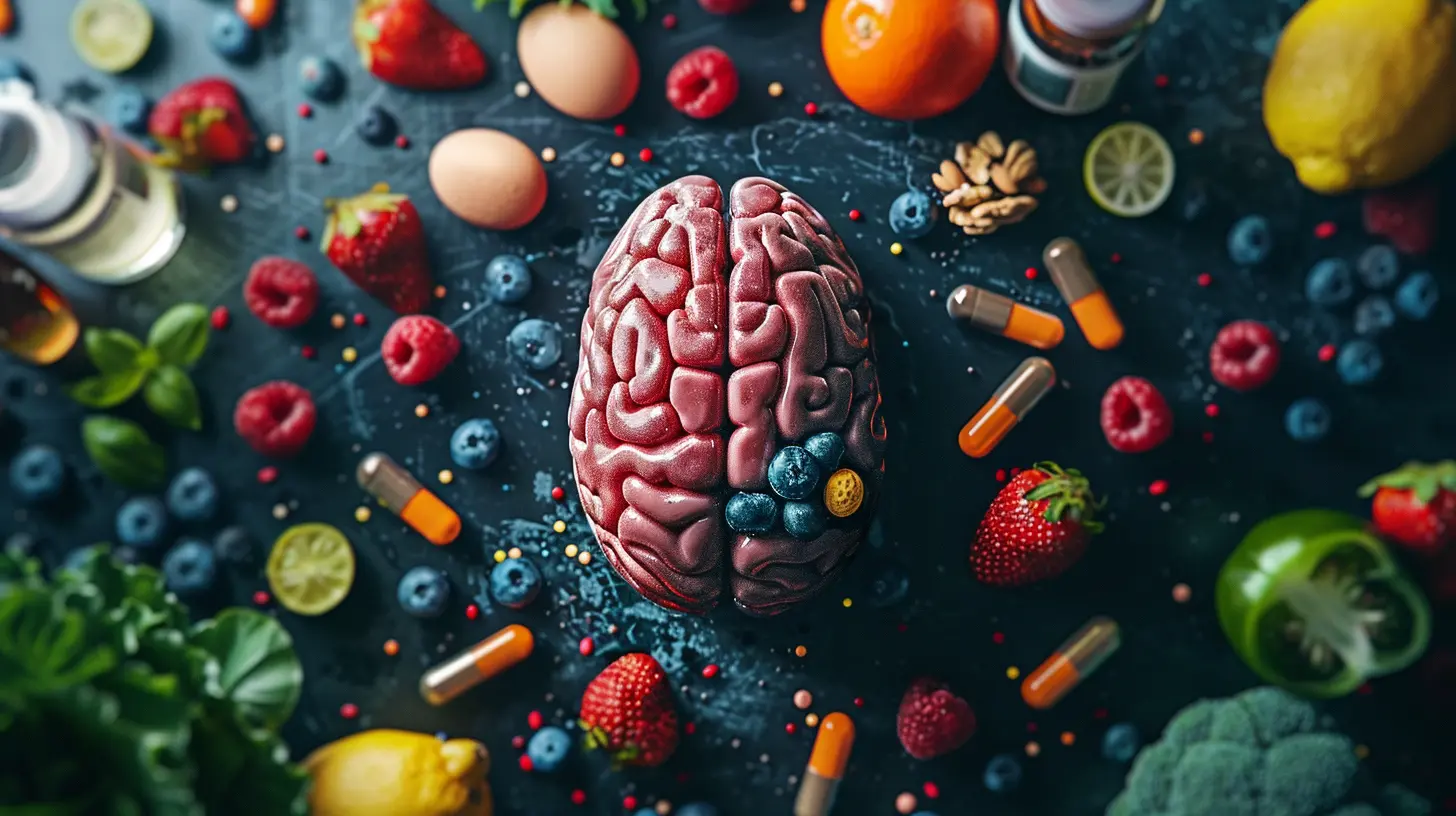31 December 2024
Have you ever wondered why some days your brain feels like a foggy windshield and other days it’s sharp as a tack? Believe it or not, a lot of that mental clarity (or lack thereof) boils down to what you’re feeding your body—and more specifically, your brain. Vitamins play a surprisingly big role in keeping your mind running like a well-oiled machine. So, let’s dive into the world of vitamins and uncover how they impact brain function and mental clarity. 
Why Are Vitamins Important for Brain Health?
Think of your brain as the command center for your body. It’s constantly working—processing information, controlling movements, and regulating emotions. To do all this, it needs fuel. While carbs, fats, and proteins keep the lights on, vitamins are like the mechanics in the background, fine-tuning everything to make sure your brain fires on all cylinders.Vitamins help produce neurotransmitters (you know, the brain’s little messengers), protect brain cells from damage, and even improve memory and focus. Without them? Your brain might as well be running on an empty tank. That’s why they’re essential. 
The Key Vitamins for Brain Function
Not all vitamins are created equal, especially when it comes to supporting brain health. Let’s break down the heavy hitters and see how each one contributes to keeping your noggin in tip-top shape.1. Vitamin B Complex: The Brain’s Best Buddy
If there’s one group of vitamins your brain loves, it’s the B vitamins. These guys are like your brain’s backstage crew, making sure everything operates smoothly.- Vitamin B1 (Thiamine): This is your brain’s energy booster. It helps convert food into energy, and a lack of it can make you feel mentally sluggish. No thiamine? Say hello to brain fog.
- Vitamin B6: This one is critical for producing neurotransmitters like serotonin, dopamine, and GABA (you know, the chemicals that affect mood and memory). Ever feel irritable or struggle to concentrate? You might be low on B6.
- Vitamin B9 (Folate): Folate is essential for memory and mental clarity. It’s like the librarian of the brain, keeping everything organized.
- Vitamin B12: The MVP of brain health. A deficiency in B12 can lead to memory problems, confusion, and even mood swings. The older we get, the tougher it becomes to absorb, which is why supplementation is often recommended.
Fun Fact:
Ever heard the phrase "hangry"? That’s your brain running low on energy (or glucose). B vitamins help ensure your brain gets what it needs to avoid those cranky moments.2. Vitamin D: The Sunshine Vitamin
We all know vitamin D is great for your bones, but did you know it’s a brain booster too? Vitamin D helps regulate mood and ward off depression. Research even links low levels of vitamin D to cognitive decline and memory issues.Think of it like this: Your brain is a plant, and vitamin D is the sunlight it needs to thrive. Without it, you’re left feeling a little wilted, mentally speaking.
3. Vitamin C: The Brain’s Shield
Vitamin C isn’t just good for fighting off colds—it’s a powerhouse for brain protection. It’s packed with antioxidants that fight off free radicals (those pesky molecules that can harm your brain cells).Plus, vitamin C helps produce neurotransmitters like norepinephrine, which keeps your brain alert and focused. It’s basically your brain’s natural bodyguard.
4. Vitamin E: The Memory Keeper
Vitamin E is like a protective helmet for your brain. It keeps brain cells from getting damaged and may even slow down memory loss as you age. Think of it as your brain’s anti-aging cream.Foods rich in vitamin E, like nuts and seeds, act as a delicious way to support long-term brain health. 
The Connection Between Vitamins and Mental Clarity
Alright, so we know which vitamins are key players, but how exactly do they impact mental clarity?Mental clarity is all about how efficiently your brain can process information, focus, and recall details. Without the right nutrients, your brain struggles to transmit signals, leading to brain fog, forgetfulness, or even that “ugh, I can’t think straight” feeling.
Vitamins help create the building blocks for neurotransmitters, which means your brain can communicate effectively. They also improve blood flow to the brain, ensuring it gets plenty of oxygen and nutrients. In short? They keep your mind razor-sharp. 
Signs You Might Be Lacking Essential Vitamins
Not getting enough vitamins can leave some pretty obvious clues. If you’re dealing with any of the following, your diet might need a vitamin boost:- Constant brain fog or trouble concentrating.
- Feeling more forgetful than usual.
- Low energy levels or mental fatigue.
- Sudden mood swings or increased anxiety.
- Poor sleep quality.
Sound familiar? Don’t worry—it’s fixable.
How to Get Brain-Boosting Vitamins
The good news is you don’t have to live on supplements to get the vitamins your brain needs. A well-balanced diet can go a long way. Here’s where to find these brain-boosting nutrients:- Vitamin B Complex: Leafy greens, whole grains, eggs, fish, and poultry.
- Vitamin D: Sunlight, fatty fish (like salmon), mushrooms, and fortified foods (like milk and cereal).
- Vitamin C: Fruits like oranges, kiwi, and strawberries, as well as veggies like bell peppers and broccoli.
- Vitamin E: Nuts, seeds, spinach, and avocados.
Pro Tip: Eating the rainbow (aka a variety of colorful fruits and veggies) is a simple way to make sure you’re getting a mix of essential vitamins.
Should You Consider Supplements?
While a healthy diet should cover most of your vitamin needs, sometimes supplements can be a helpful backup plan—especially if you have dietary restrictions or a medical condition that makes it hard to absorb nutrients.For example:
- Vegans and vegetarians might need a vitamin B12 supplement, as it’s mostly found in animal products.
- If you live somewhere with limited sunshine, a vitamin D supplement could work wonders for your mood and mental clarity.
That said, always chat with a doctor before popping pills (even the vitamin kind). Overdosing on certain vitamins can do more harm than good.
Lifestyle Tips for Better Brain Health
Vitamins are only part of the puzzle. To optimize your brainpower, try combining a nutrient-rich diet with these tips:1. Stay Hydrated: Your brain is 75% water. Dehydration = brain fog.
2. Exercise Regularly: Moving your body improves blood flow to the brain.
3. Get Enough Sleep: Sleep is like hitting the reset button for your brain.
4. Manage Stress: Chronic stress depletes certain vitamins (looking at you, vitamin C). Try yoga, meditation, or even just breathing exercises.
Think of these habits as the perfect support system for all those brain-friendly vitamins you’re eating.
The Bottom Line
Your brain is a complex organ, but the good news is, it thrives on the simple stuff: good food, proper vitamins, and healthy habits. Vitamins like B complex, D, C, and E aren’t just minor players; they’re essential tools in keeping your brain sharp, focused, and resilient.So, next time you’re meal planning, think about it as fuel for your brain. After all, you wouldn’t put low-quality gas in a Ferrari, right? Treat your brain with the same care—it’s the most powerful engine you’ve got.










Kinsley Ortiz
Essential vitamins significantly enhance brain function and mental clarity—prioritize your nutrition for optimal health!
February 8, 2025 at 4:26 AM